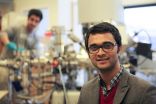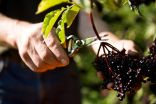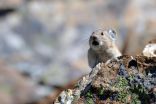(Press-News.org) One of the enduring mysteries of the human experience is how and why humans moved from hunting and gathering to farming.
From their beginnings humans, like other mammals, depended on wild resources for sustenance. Then between 8,000 and 12,000 years ago, in a transitional event known as the Neolithic Revolution, they began to create and tend domestic ecosystems in various locations around the world, and agriculture was born.
Despite decades of research into this major human advancement, scientists still don't know what propelled it.
The recent work of a research team led by Arizona State University postdoc Isaac Ullah narrows the mystery by showing what variables might have affected the transition.
Ullah is an archaeologist in the School of Human Evolution and Social Change in the College of Liberal Arts and Sciences. Most of his research uses dynamical systems theory (DST) and centers on understanding the ways in which human societies changed with the advent of plant and animal domestication.
His latest research project, undertaken with Ian Kuijt of the University of Notre Dame and Jacob Freeman of Utah State University and published this week in the Proceedings of the National Academy of Sciences, combined the field of DST with existing research on the origins of plant and animal domestication.
For Ullah, DST provided a way around the obstacles researchers have historically faced in defining the origins of domestication: the transition occurred long ago; much of the evidence for the impetus for the transition was not preserved in the archaeological record; and the transition didn't occur everywhere or all at once and seems to have been quite different -- involving different crops and animals -- in the places where it did occur.
Ullah's team approached the ethnographic record of human subsistence from the perspective that human subsistence systems are complex adaptive systems, or systems composed of many interrelated parts that react to and interact with their environment.
"We used ideas generated from observations of other dynamical systems - both in the real world and in computer simulations - to create hypotheses about the way data about human subsistence ought to pattern when subjected to specific statistical analyses," Ullah says.
The main phenomena they hoped to find were 'attractors' and 'repellers.' In DST, an attractor is a combination of variable states that is relatively stable over time, whereas a repeller is a combination of variable states that is not.
"In other words," Ullah explains, "DST tells us that there ought to be some combinations of subsistence behaviors and environmental characteristics that are generally stable and some that aren't."
He says that when the researchers initially conducted the analysis, they weren't sure if attractors and repellers would be observable, but from early on, they saw interesting clusterings of societies that suggested the attractor/repeller phenomenon.
What was even more interesting to the team was that they began to see that the clustering was largely controlled by a small number of important variables, such as resource density, mobility and population size.
The team discovered that changes in these variables brought some attractors closer together, created new ones or eliminated others.
That showed them that even though the general possibilities for human subsistence is largely governed by a small number of highly important variables, moving from one subsistence attractor to another is more possible under some socio-environmental conditions than others.
"It is this specific insight that may help to explain why the transition to food production happened in some times and places but not in others, why it happened so differently in all these places and at different times and rates," Ullah states.
INFORMATION:
WASHINGTON, DC - July 21, 2015 - Each year, scientists create an influenza (flu) vaccine that protects against a few specific influenza strains that researchers predict are going to be the most common during that year. Now, a new study shows that scientists may be able to create a 'universal' vaccine that can provide broad protection against numerous influenza strains, including those that could cause future pandemics. The study appears in mBio, the online open-access journal of the American Society for Microbiology.
"The reason researchers change the vaccine every year ...
WASHINGTON -- Advertisers hoping to sway consumers might want to rethink running spots within media with violent or sexual themes, and might do better if the ads themselves have a G-rating, according to a study published by the American Psychological Association. Instead, violent and sexual media content may impair advertising's effectiveness and ultimately deter purchasing, the research found.
"We found almost no evidence that violent and sexual programs and ads increased advertising effectiveness," said Brad J. Bushman, PhD, professor of communication and psychology ...
Believe it or not: X-ray works a lot better on rocks than on paper. This has been a problem for conservators trying to save historical books and letters from the ravages of time and fungi. They frankly did not know what they were up against once the telltale signs of vandals such as Dothidales or Pleosporales started to spot the surface of their priceless documents
Now Diwaker Jha, an imaging specialist from Department of Chemistry, University of Copenhagen, has managed to adapt methods developed to investigate interiors of rocks to work on paper too, thus getting a ...
HOUSTON -- (July 21, 2015) - Phosphates artificially added to dairy and cereal products appear to cause bigger spikes in blood phosphorus levels than naturally occurring phosphates, potentially putting harmful stress on kidneys. Too much dietary phosphate stiffens blood vessels, enlarges the heart and is bad for bones, but a new study by Houston Methodist researchers suggests it matters where the phosphates come from.
The scientists' report will appear in the August 2015 issue of the American Journal of Clinical Nutrition (early online).
"The study suggests people should ...
The negative health effects of international air travel are well documented but now it seems that the common elderberry can provide some relief.
Associate Professor Evelin Tiralongo and Dr Shirley Wee from Griffith's Menzies Health Institute Queensland (MHIQ) have completed a clinical trial showing that an elderberry supplement can provide some protection from cold and flu-like symptoms following long-haul flights.
Intercontinental air travel can be stressful and affect a passenger's physical and psychological wellbeing. Whilst jet lag and fatigue remain the best known ...
A special type of synthetic sugar could be the latest weapon in the fight against superbugs.
A team of scientists from The University of Queensland and Queensland biotechnology company Alchemia have discovered a potential new class of antibiotics inspired by sugar molecules produced by bacteria.
New antibiotics to which bacteria are unlikely to develop resistance are urgently needed to combat the rise of superbugs - drug resistant bacteria.
The research, led by Professor Matt Cooper and Dr Johannes Zuegg from UQ's Institute for Molecular Bioscience (IMB) in partnership ...
Swedish researchers at Uppsala University and the Karolinska Institute have found that genes that control the biological clocks in cells throughout the body are altered after losing a single night of sleep, in a study that is to be published in the Journal of Clinical Endocrinology and Metabolism.
"Previous research has shown that our metabolism is negatively affected by sleep loss, and sleep loss has been linked to an increased risk of obesity and type 2 diabetes. Since ablation of clock genes in animals can cause these disease states, our current results indicate that ...
TORONTO, ON - When Julie compares her husband George to her friend's husband Sam, she can't help but notice that Sam is better is better at helping his children with homework. But rather than be upset about George's shortcomings in the children's homework arena, Julie reasons that since she enjoys doing homework with their children, it's not that important that George do it.
What Julie has just done is protect her partner (and their relationship!) from the negative implications of her own comparison. But not all members of a couple engage in these justifying explanations ...
Information embedded within DNA has long contributed to biodiversity conservation, helping to reconstruct the past history of species, assess their current status, and guide strategies for their protection. A new study shows that the entire genome of hard to study species may now be available to scientists without the need to handle or even see their study organism, opening up the field of conservation genomics to the use of non-invasive sampling techniques.
Endangered and elusive species by definition may be both rare and difficult to locate. As a result, conservation ...
COLUMBUS, Ohio - If there's one thing advertisers think they know, it is that sex and violence sell.
A new analysis, however, provides some of the best evidence to date that this widely accepted adage just isn't true.
Researchers analyzed the results of 53 different experiments (a so-called meta-analysis) involving nearly 8,500 people, done over 44 years. All of these experiments examined some facet of the question of whether sexual or violent media content could help sell advertised products.
When all the results are considered together, the overall conclusion, with ...


